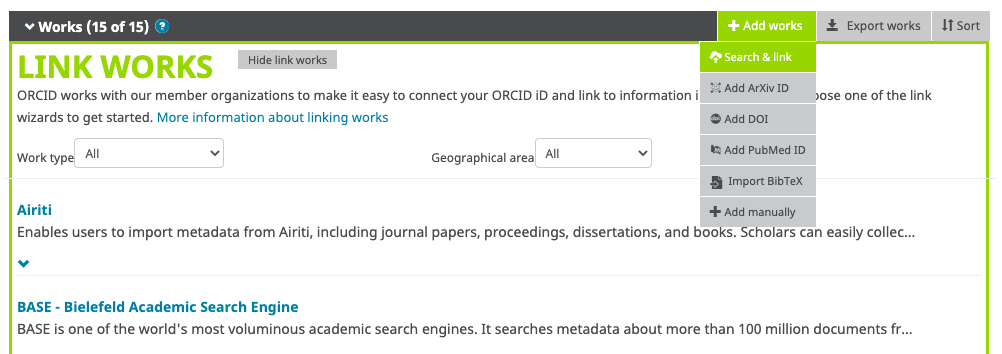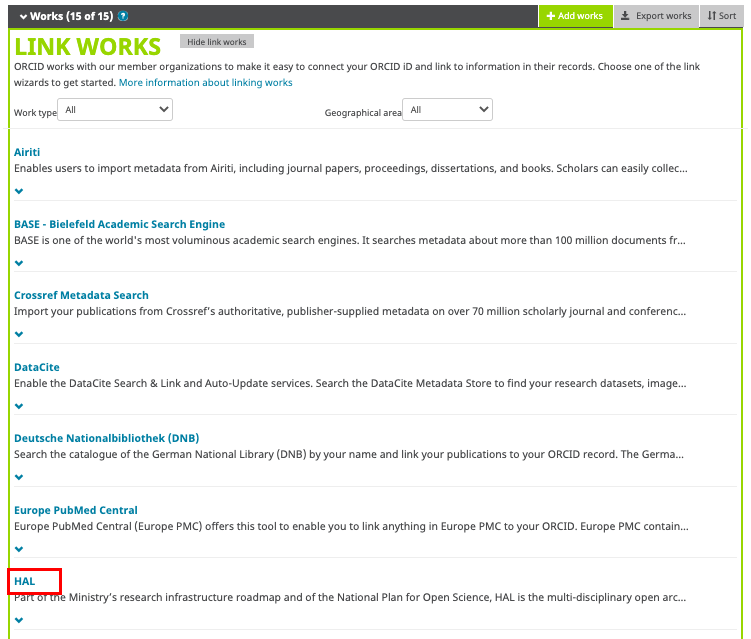A Key Component of Your Digital Identity
What if you could complete your ORCID record with your publications deposited in HAL? This is now possible, even if you do not (yet) have a HAL account. HAL is now referenced by ORCID as a database that researchers can use to import their works.
ORCID provides a persistent digital identifier to uniquely identify scientific and other academic authors. The associated record page, properly completed, is a key component of your digital identity.
How to complete your record with HAL? It’s very simple: From your ORCID record, after logging in, you simply select HAL in the list of databases listed in the Search & Link Wizard, which you can access from the +Add works link in the Works section of your record.

Select +Add Works, then select Search & link

Select HAL from the list
The system will then ask you if you allow HAL to update your data in ORCID. Afterwards, everything takes place on HAL. You get a list of publications corresponding to the author name of the ORCID record. You then simply click on the ADD TO ORCID button for each publication you wish to add to your record. The status of the button will change to ALREADY PRESENT IN ORCID.
The feature is also available in the HAL menu: My space/Send documents to ORCID.
More than a tool to help complete your ORCID record, this functionality will improve the referencing of your deposits because the source of the import is clearly displayed in your ORCID record.
You will have to be patient a little longer to import your publications from your ORCID record into HAL. Further developments are necessary to avoid duplicates and to automatically improve the quality of some metadata.
ORCID France: A national policy
The enablement of this feature in HAL is part of the CNRS’ ORCID membership.
ORCID is a non profit organization whose business model is based on free access for researchers and on membership for organizations. This provides them with a set of tools and services based on ORCID data and APIs. Joining a consortium is a way for organizations to benefit from preferential membership rates.
The creation of the “ORCID France” consortium in November 2019 is one of the actions defined in the National Plan for Open Science (July 2018): Be part of a sustainable, European, and international dynamic (axis 3). It currently has 35 members.
In addition to launching a national strategy for the identification of researchers, the consortium also aims to strengthen the representation of French research within ORCID.
The features that HAL has just released benefit the whole community of researchers and is an important step in the implementation of the National Plan for Open Science.
* * *
Et si vous complétiez votre dossier ORCID avec vos publications déposées dans HAL ? C’est désormais possible, même si vous n’avez pas (encore) de compte dans HAL.
HAL est en effet maintenant référencé dans le système d’ORCID comme base de données que le chercheur peut utiliser pour importer ses travaux.
Pour rappel, ORCID (Open Researcher and Contributor ID) fournit un identifiant numérique persistant, qui permet d’identifier de manière unique les chercheurs et auteurs de contributions académiques et scientifiques. Le dossier associé, bien complété, est un élément clé de votre identité numérique.
Comment le compléter à partir de HAL ? C’est très simple : depuis votre dossier ORCID, après vous être connecté, il vous suffit de sélectionner HAL dans la liste des bases de données proposées:

Le système vous demandera ensuite d’autoriser HAL à mettre à jour vos données dans ORCID. Après, tout se passe sur HAL : vous obtenez une liste de dépôts correspondant au nom d’auteur du profil ORCID. Il vous suffit alors de cliquer sur le bouton AJOUTER À ORCID pour chacune des publications que vous souhaitez ajouter à votre dossier. L’état du bouton bascule alors à DÉJÀ PRÉSENT DANS ORCID.
Vous trouverez également la fonctionnalité d’import dans ORCID dans votre espace (Mon espace/Envoyer des documents sur ORCID). En savoir plus: lien page doc
Au-delà de l’aide pour compléter votre dossier ORCID, le référencement de vos dépôts sera amélioré: la source de l’import est clairement mentionnée dans votre dossier ORCID.
Encore un peu de patience toutefois pour alimenter HAL avec les publications de votre dossier ORCID, car des développements supplémentaires sont nécessaires. Il s’agit d’une part d’éviter d’importer des doublons : si la publication a un identifiant DOI, c’est assez simple mais toutes les publications n’en ont pas. Et, d’autre part, il est nécessaire d’étudier l’amélioration de la qualité des données au moment de l’import : en fonction de la façon dont vous avez complété la liste de vos travaux dans ORCID (import depuis une base de données ou saisie manuelle ), celles-ci peuvent en effet être de qualité variable.
Stratégie nationale avec ORCID France
Le déploiement de cette fonctionnalité s’inscrit dans le cadre de l’adhésion du CNRS à ORCID.
Le modèle économique d’ORCID repose sur la gratuité pour les chercheurs, et en parallèle pour les organisations, sur une adhésion qui leur permet de disposer d’une gamme d’outils et de services basés sur les données et les APIs ORCID. Se regrouper en consortium permet aux organisations de bénéficier de tarifs préférentiels et de s’organiser à l’échelle nationale.
La mise en place du consortium « ORCID France » constitue l’une des actions définies dans le Plan national pour la science ouverte (juillet 2018): s’inscrire dans une dynamique durable, européenne et internationale (axe 3). ORCID France a ainsi été créé en novembre 2019 et comprend actuellement 35 membres.
Au-delà d’une mise en œuvre de la stratégie nationale concernant l’identification des chercheurs, le consortium a aussi pour objectif de renforcer la représentation de la recherche française au sein d’ORCID.
Les fonctionnalités que HAL vient de déployer bénéficient à l’ensemble de la communauté des chercheurs et constituent une étape importante de la mise en œuvre du Plan national pour la science ouverte.